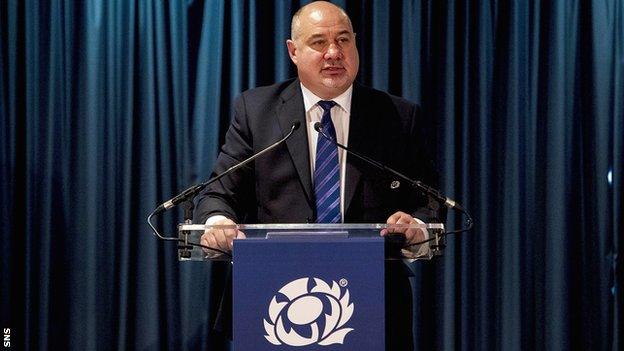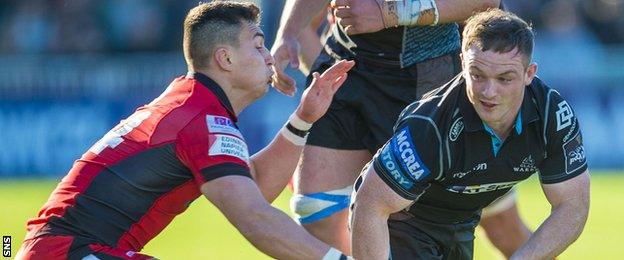Scottish Rugby: Semi-professional 'Super Six' league heads domestic overhaul
- Published

Scottish Rugby chief executive Mark Dodson revealed plans for a radical domestic restructuring
Scottish Rugby will introduce a six-team semi-professional league as part of a £3.6m overhaul of its domestic structure from 2019-20.
The "Super Six" will replace the BT Premiership, and sit directly above an amateur 12-team Championship.
Below this will come a new three-tier National League system.
The plans, unveiled at Saturday's annual general meeting, aim to close the gap between the club game and professional teams in Scotland.
Scottish Rugby is funding the restructuring with £3.6m of new investment over five years, and the changes will take effect in time for the 2019-20 season.
At present, the BT Premiership, the top tier of the Scottish club game, has 10 clubs, with the National One, Two and Three leagues featuring 12 clubs each.
Scottish Rugby's new domestic set-up |
|---|
A semi-professional "Super Six" replaces the amateur BT Premiership |
Directly below this will be an all-amateur 12-team Championship |
This will sit above a three-tier National League system |
The union will also revamp its Exiles programme for Scottish-qualified players outside Scotland, implementing a scouting network across the UK and "five other international rugby markets".
Scottish Rugby says performance links with London Scottish, Lille Metropole and Stade Nicois in France, North Harbour in New Zealand, Western Force in Australia, and Stellenbosch Academy in South Africa will complement wider player development.
How will the 'Super Six' work?
All the Super Six teams will be overseen by the governing body's high performance department, which will allocate funding for head coaches, strength and conditioning, and analysis support. Funding costs for squads of 35 players will be split between Scottish Rugby and the clubs, with teams playing a 20-match season.
With franchises in the Super Six running for five years at a time, Scottish Rugby hopes teams in the Scottish Championship and national leagues "can build stronger community ties and focus investment on developing their clubs in the absence of player payments".
Clubs can apply to join the Super Six tier, but will be required to contribute their own investment "to complement Scottish Rugby's financial support".

Super Six teams will be aligned with Edinburgh or Glasgow Warriors to aid the development of talented players
The union says teams will be geographically aligned with Scottish Rugby's four regions - Caledonia, Glasgow and the West, Edinburgh and the East and the Borders - with two floating teams, and partnered with one of Scotland's two professional teams, either Glasgow Warriors or Edinburgh Rugby.
The national leagues will be feeder clubs for Super Six teams in their region to ensure an upward flow of talent through the leagues to the top tiers.
'A fresh start for every club'
The governing body announced on Friday it had generated £50m in annual turnover for the first time, and chief executive Mark Dodson hailed the radical domestic shake-up at Saturday's AGM.
"It is a new beginning for our whole sport, not just the top clubs," Dodson said. "It resets the ambitions of everybody and offers every club a fresh start.
"For the first time since the game went professional this strategy involves all the clubs in the success of our national team. We want to create strong sustainable clubs that can play at the level which best suits them and that they can choose.

Ayr beat Melrose in last year's BT Premiership final to clinch the title
"We wanted to create clear pathways for players, coaches and officials, alongside closing the gap between our domestic game and the professional teams so we can maximise the resources we have and allow talented players to develop in good environments and fulfil their potential.
"We want to see clubs invest in their infrastructures and future growth so the National Leagues will have amateur status and the Super Six will be where player payments make better sense.
"This is not a radical plan, it is simply overdue and we look forward to working with all the clubs in Scotland to deliver this new structure for the wider benefit of the game at large."